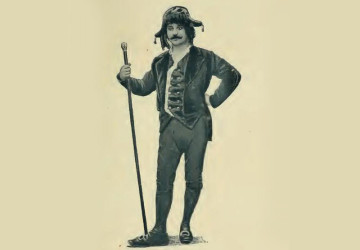The Origins of Rugantino: Between History and Legend
Rugantino is a legendary figure in the Roman cultural landscape, symbolizing irreverence, courage, and cunning. Although his exact origins are shrouded in mystery, Rugantino is often described as a bold and carefree young man, characterized by a strong sense of honor and a propensity for justice, making him beloved and respected in popular culture.
The origins of Rugantino are not clearly documented, but the character seems to have emerged in Roman popular culture around the 18th century. The Commedia dell'Arte, with its regional masks representing various social and character stereotypes, provided fertile ground for the development of characters like Rugantino, reflecting the pride, temperament, and spirit of independence of the Roman people.
Characteristics and Personality of Rugantino
Rugantino is distinguished by his rebellious spirit and inclination to challenge authority. His figure embodies the idealization of the true Roman: witty, frank, and always ready with a retort, but also capable of great acts of generosity. His cheeky attitude and courage have made him a popular hero, celebrated in stories passed down from generation to generation.
Rugantino in Folklore and Popular Culture
Rugantino's Presence in Theatre and Literature
Rugantino is not just a character of folklore; he has become a cultural icon thanks to his presence in numerous theatrical, literary, and cinematic works. His figure was immortalized by Alberto Sordi in the namesake film of 1973, which helped to consolidate the image of Rugantino as a symbol of Roman identity.
Moreover, the musical comedy "Rugantino", first staged in 1962, remains one of the greatest successes of Italian theater, celebrating the irreverent nature and vitality of this character.
Rugantino: A Symbol of Eternal Rome
Through the centuries, the figure of Rugantino has become synonymous with Rome and its culture. He represents the essence of the Roman spirit, with all its contradictions: the ability to face life with irony and lightness, but also with courage and determination. Thus, Rugantino is not just a character, but an emblem of Romanity, continuing to live in the hearts of Romans and those who love this city.
The Legacy of Rugantino Today
Rugantino in Collective Memory
As mentioned, the figure of Rugantino continues to be a living presence in contemporary Roman culture. He is often cited as an example of virtues such as loyalty and courage, and his name is invoked in contexts ranging from politics to sports, testifying to his enduring influence. Rugantino remains a model of cultural identity for Romans and a point of reference in the city’s social and cultural landscape.
Today, Rugantino symbolizes the ability to keep tradition alive in a rapidly changing world. His figure still inspires artists, writers, and filmmakers, who see in him the embodiment of the authentic values of Roman life. Rugantino thus represents a bridge between past and present, demonstrating how the cultural identity of a community can withstand the test of time and even renew itself.
FAQ: Frequently Asked Questions about Rugantino
Why is Rugantino considered an icon of Roman culture?
Rugantino is considered an icon of Roman culture because he represents characteristics and values deeply rooted in Roman identity, such as frankness, ingenuity, and a certain disdain for authority. His figure has been celebrated in numerous theatrical, literary, and cinematic works, becoming a symbol of Romanity.
What is the connection between Rugantino and cinema?
The connection between Rugantino and cinema is mainly represented by the 1973 film with Alberto Sordi, which helped popularize the figure among a wider audience. In the film, Rugantino is a cheeky and courageous character, living adventures in the heart of Rome, consolidating his status as a cultural icon.
Is Rugantino based on a true story?
No, Rugantino is not based on a true story but is rather a legendary character that synthesizes various aspects and traits of the Roman people. His figure is the result of popular tradition and artistic creativity, making him a symbol of Roman identity through the centuries.
How is the figure of Rugantino celebrated today?
Today, the figure of Rugantino is celebrated through theatrical performances, references in popular culture and cinema, and as a point of reference in discussions about Romanity.

